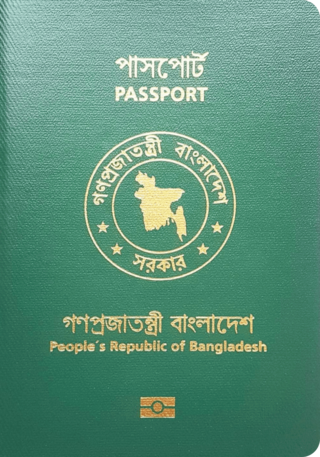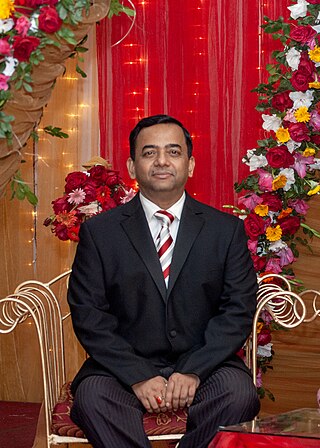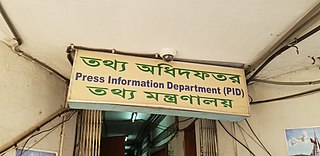Related Research Articles

Bangladesh, officially the People's Republic of Bangladesh, is a country in South Asia. It is the eighth-most populous country in the world and twelfth-most densely populated with a population of 173,562,364 in an area of 148,460 square kilometres (57,320 sq mi). Bangladesh shares land borders with India to the north, west, and east, and Myanmar to the southeast. To the south, it has a coastline along the Bay of Bengal. To the north, it is separated from Bhutan and Nepal by the Siliguri Corridor, and from China by the mountainous Indian state of Sikkim. Dhaka, the capital and largest city, is the nation's political, financial, and cultural centre. Chittagong is the second-largest city and the busiest port. The official language is Bengali, with Bangladeshi English also used in government. Islam is the official and largest religion and Bengali Muslims form the largest ethnoreligious group in the country.

The foreign relations of Bangladesh are Bangladesh's relationships with foreign countries. The Government of Bangladesh's policies pursue a moderate foreign policy that heavily relies on multilateral diplomacy, especially at the United Nations (UN) and the World Trade Organization (WTO). Since its independence in 1971, Bangladesh has stressed its principle of "Friendship towards all, malice towards none" in dictating its diplomacy. As a member of the Non-Aligned Movement, Bangladesh has tended to not take sides with major powers. Since the end of the Cold War, Bangladesh has pursued better relations with its neighbours and other nearby states.

The Bangladeshi passport is an ICAO compliant, machine-readable and biometric e-passport issued for the purpose of travel to foreign countries by the passport holder. Bangladesh is the first country in South Asia to issue e-passports for all eligible citizens. The passport booklet is manufactured, printed and issued by the Department of Immigration & Passports of the Ministry of Home Affairs. This electronic microprocessor chip embedded e-passport has forty-one different security features, including holographic images embossed in thin-film laminate, which change colour under light and appear to move. Demographic and biometric information of the e-passport holder are stored on the chip inside the e-passport. This information includes the fingerprints of all ten fingers of the passport holder; the iris scan of both eyes; a color photograph of the face of the bearer; their digital signature; etc. Depending on the age of the applicant, the e-passport is valid for either five years or ten years and it is distributed by the Government of The People's Republic of Bangladesh, or by any of its overseas diplomatic missions, to eligible Bangladeshi nationals who are citizens by birth, by descent or through naturalization.

Anwar Hossain Manju is a Bangladeshi politician who is a former Jatiya Sangsad member representing Pirojpur-2 constituency which consists of Kawkhali, Bhandaria and Zianagar upazilas until January 2024. He was elected a member of Jatiya Sangsad a total of seven times. He is a former Minister of Water Resources, Minister of Communications as Communications Transport and Minister of Energy and Mineral Resource.

Kaler Kantho is one of the most popular Bengali newspapers in Bangladesh. It is an enterprise of East West Media Group (EWMG), a sister concern of Bangladesh's leading business conglomerate Bashundhara Group. The same group owns Bangladesh Pratidin, Daily Sun, News24, Radio Capital and Banglanews24.

Bangladesh Pratidin is a Bengali-language daily newspaper in Bangladesh. It was founded on 15 March 2010. Bangladesh Pratidin tops the list of highest circulated dailies in the country out of 345 newspapers published from Dhaka and elsewhere, the information minister told parliament 10 March 2014. Abu Taher is the Acting Editor of Bangladesh Pratidin. Bangladesh Pratidin is a subsidiary of East West Media Group (EWMG), which is owned by Bashundhara Group. On behalf of EWMG, the publisher of the newspaper is Moynal Hossain Chowdhury.

The first Hasina ministry was the government of Bangladesh during the 7th legislative session of the Jatiya Sangsad following the 1996 general election; the 20-minister cabinet was formed on 23 June 1996 and dissolved on 15 July 2001.
Naem Nizam is a Bangladeshi journalist, writer, columnist, and editor of daily Bangladesh Pratidin. Nizam is also the director of East West Media Group, the largest media conglomerate in Bangladesh. He is former CEO of News24 and Radio Capital. He is the former managing director of STV-US.

The Ministry of Public Administration is primarily responsible for management of public administration in Bangladesh. the current Senior Secretary is Dr. Mokhles Ur Rahman.
Motahar Hossain is a Bangladesh Awami League politician and a former Jatiya Sangsad member representing the Lalmonirhat-1 constituency during 2001–2024. He served as the State minister of Primary and Mass Education during 2009–2014.
The Bangladesh Film Certification Board is a regulatory agency that is responsible for the censorship of films and is located in Dhaka, Bangladesh.

Benazir Ahmed is a retired Bangladeshi police officer who served as the 28th inspector general of the Bangladesh Police. Prior to his appointment as IGP, he served as the director general of the Rapid Action Battalion (RAB) from January 2015 to April 2020. He is currently on a US sanctions list due to RAB's alleged role in forcibly disappearing citizens since December 2021.
Department of Public Libraries is a government department under the Ministry of Cultural Affairs of the Government of Bangladesh. It is responsible for government owned public libraries in Bangladesh and is located in Dhaka, Bangladesh.

Press Information Department or PID, is a government body responsible for disseminating government information to the media and a media regulatory organization. It is located in Dhaka, Bangladesh. It is under the Ministry of Information.
Department of Mass Communication is a government department under the Ministry of Information and Broadcasting in Bangladesh. Its headquarter is located in Dhaka, It has 68 field level offices all over the country. Among those 64 District Information Offices are located in 64 district headquarters and 4 offices are located in 4 Upzilas of hill tracts region.

Directorate of Secondary and Higher Education is a Bangladesh government Directorate under the Ministry of Education responsible for improving education standards and access to education. The director general of the Directorate is Nehal Ahmed.

The Agriculture Information Service is a Bangladesh government agency under the Ministry of Agriculture responsible for proving information on modern agricultural methods to farmers in the country. Nurul Islam is the director of the agency.
The COVID-19 pandemic in Bangladesh was a part of the worldwide pandemic of coronavirus disease 2019 caused by severe acute respiratory syndrome coronavirus 2. The virus was confirmed to have spread to Bangladesh in March 2020. The first three known cases were reported on 8 March 2020 by the country's epidemiology institute, IEDCR. Since then, the pandemic has spread day by day over the whole nation and the number of affected people has been increasing. Bangladesh is the second most affected country in South Asia, after India.

Kuwait Bangladesh Friendship Govt. Hospital or Kuwait Bangladesh Hospital is a government hospital situated in Dhaka, Bangladesh. The hospital was funded by Kuwaiti Joint Relief Committee. This is the first hospital to provide medical services to coronavirus infected patients as prescribed by the Government of Bangladesh.
References
- 1 2 "Welcome to Ministry of Information". Ministry of Information. Retrieved 3 January 2019.
- ↑ Pratidin, Bangladesh (24 December 2024). "ডিএফপির নতুন মহাপরিচালক খালেদা বেগম | | বাংলাদেশ প্রতিদিন". bd-pratidin.com (in Bengali). Retrieved 24 December 2024.
- ↑ "PM takes a swipe at those seeking constitution reform". The Daily Star. 12 August 2015. Retrieved 3 January 2019.
- ↑ "চলচ্চিত্র ও প্রকাশনা অধিদপ্তর". dfp.portal.gov.bd. Retrieved 24 December 2024.
- ↑ "The making of Stop Genocide and disappearance of Zahir Raihan". The Daily Star. 19 December 2008. Retrieved 3 January 2019.
- ↑ "Bangladesh Pratidin tops circulation list". The Daily Star. 11 March 2014. Retrieved 3 January 2019.
- ↑ Kamol, Ersahad. "Bangladesh Film Archive celebrations". The Daily Star. Retrieved 3 January 2019.
- ↑ "Govt to use community radios for publicity". The Daily Star. 1 March 2017. Retrieved 3 January 2019.